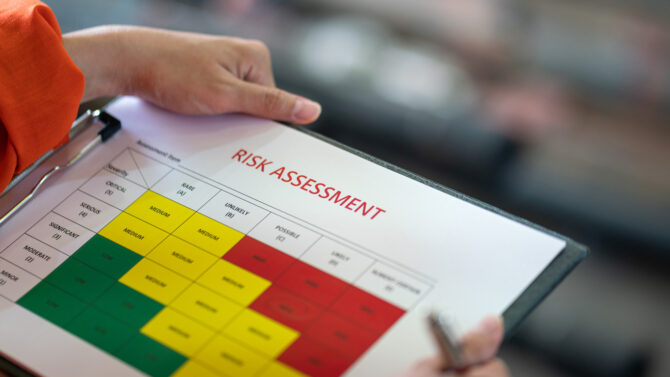What is CoSHH? Everything You Need to Know for Compliance
The Control of Substances Hazardous to Health (CoSHH) are a set of regulations that help employers assess the hazard and risks associated with using substances and materials needed for a workplace to function.
Good examples include cleaning products, and industrial paints used in workshops and car body shops, and even many types of dusts created especially in warehouses and construction sites.
The overall idea is by identifying the hazards and risks posed, employers can deploy control measures and draw up safe systems of work to keep their employees safe from the various hazards that may be present from substances and materials. By extension this includes customers, contractors, and any visitor to a workplace that may be classed as at risk.
As with all aspects of health and safety, should you be found to be in breach of your responsibilities towards the law and de facto the people that work for you, the fines and penalties can be severe. CoSHH, however, is more than just a legal threat and subsequent compliance as we’ll see.
With this in mind let’s explore the Control of Substances Hazard to Health regulations in more depth.
Why is CoSHH Important?
If you have robust CoSHH compliance in place, you’ll find that:
- You Maintain Good Productivity Levels – Keeping employees safe from the ill effects of working with substances and materials that can cause harm maintains productivity. CoSHH based injuries that result in short term lost time put pressure on the rest of the business to maintain deadlines, and long term absences incurs the costly training of new staff.
- Harm can take many forms and can be immediate such as an irritant or corrosive chemical burn to more severe long-term lung damage.
- Your Good Reputation Remains Intact – Should employees, customers, contractors, or visitors be harmed by a chemical used by your business the damage to reputation can be potentially catastrophic. Once trust is lost it is hard to rebuild it. Keeping everyone healthy and safe is the best way to ensure your well earned reputation remains intact.
- You Avoid Legal Costs – Cometh the CoSHH based injuries and cometh the lawyers. And the lawyers and associated costs are not cheap. It’s not just the direct cost that impact the bottom line figure, but the lost time spent putting together a legal defence. Good CoSHH compliance keeps the lawyer, sorry I mean wolf from the door.
- You Don’t Fall Foul of The Law – If you’re found in breach of CoSHH regulations the punishment can take the form of fines to prison sentences. None of which are fun! If the breach is considered severe, this can spell the end of a business.
- You Maintain Morale – Should an employee be injured while carrying out their duties, the fest of your staff may feel uneasy. This can strain industrial relations in many ways and break the cohesive bond needed to make a business function well. Good CoSHH compliance avoids these issues.
The importance of CoSHH cannot be overstated and the consequences from poor CoSHH compliance cannot be underestimated.
CoSHH Regulations and Compliance
According to the UK’s Health and Safety Executive, CoSHH is defined as:
“The law requires you to adequately control exposure to materials in the workplace that cause ill health. This is the Control of Substances Hazardous to Health Regulations (COSHH).”
As such, your responsibilities are to ensure your employees, contractors, customers, and any onsite visitor are as safe as possible from exposure to chemical fumes, particulate matter, harmful liquids and infection risk sources.
So how is this accomplished? It all starts with a CoSHH assessment.
What is a CoSHH Assessment?
It is extremely rare that a business will not require a CoSHH assessment for some substances and materials that are used or created in the workplace. From cleaning products to industrial glues all require you to assess them for hazards and risks to your employees.
CoSHH assessments are your starting point in determining the hazards and risks associated with workplace substances and materials. Once identified you can identify the following:
- What can you do to remove the hazard and reduce the risks of using the substance or material. Could you replace the product with a less hazardous substance, for example water based paints?
- Who’s at risk from working with the substance? This may not only be the user of the material, but it could be people within a certain proximity to it.
- What are the hazards from contact with the substance or material?
- What would contact look like? Would it be swallowed, inhaled, infection, skin or eye contact? Is there a danger of splashing or inhaling fumes for example?
- What happens should contact occur? First aid, call an ambulance etc.
- Emergency procedures. What happens should an unforeseen incident such as a spill occur?
The basics of the hazards involved with a substance or material are highlighted on the Health Safety Data Sheet (HSDS), or Materials Data Safety Sheet (MSDS). Depending on the type of substance or material involved, you should be able to find relevant information on the nature of the hazard. From here, you can take the next steps to CoSHH compliance.
Next Steps to CoSHH Compliance
Once you have your assessment completed, the next steps are to:
- Deploy Control Measures – This involves formulating control measures that keep exposure and use of harmful substances and materials to a minimum. This can involve engineering controls, limiting the number of people who can access the substance or material, wearing personal protective equipment (PPE), safe working practices, and material substitution where possible.
- Train Staff – Anyone who needs to use the material must be trained in how to use it safely and adhere to all control measures.
- Monitor and Health Surveillance – CoSHH puts a strong emphasis on monitoring the effectiveness of control measures and staff health. It is important that this is done at regular intervals, and you keep good records which are reviewed for health issues and possible gaps in the control measure system.
- Emergency Protocols – Should unforeseen exposure occur; it is important you have procedures in place to deal with incidents of this kind.
Your Next Steps – Ask the Experts
CoSHH is a big subject with many areas that can trip up the inexperienced. To get ahead talk to us today and with our expertise, online courses and advice, we can help you bring your CoSHH compliance up to speed quickly and as pain free as possible.
About Us
Westminster Compliance was established to provide a more personal, proactive health and safety consultancy that would keep businesses working and compliant with ever-changing legislation.
Our presentations and training are interesting and fun because we want our clients to buy into health and safety, and definitely not to see it as a boring, unnecessary nuisance. We know that our best service is provided to small and medium sized organisations and have developed a system that works in most industries.
We stick with straightforward language, keeping away from jargon, and do not make ridiculous promises. Most importantly, we realise that we are working with human beings.




